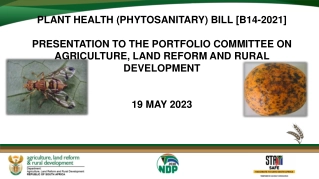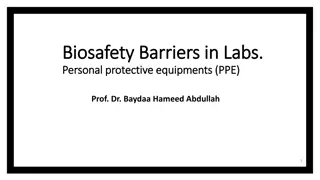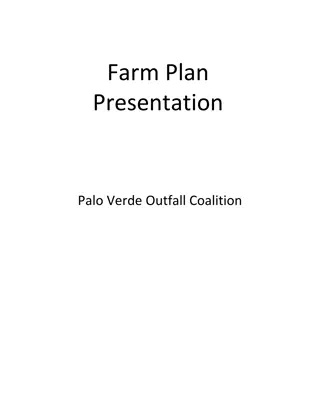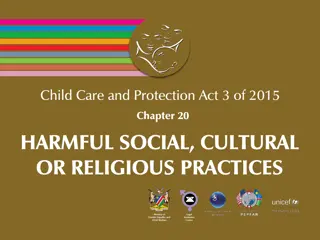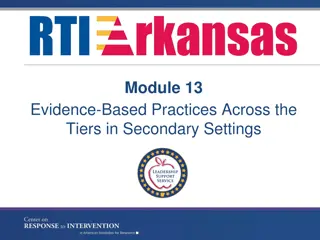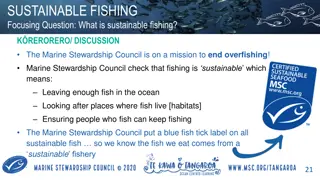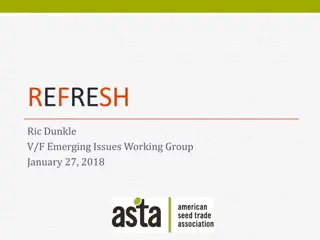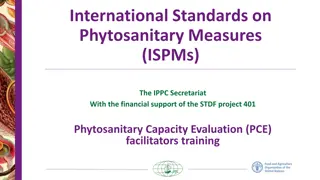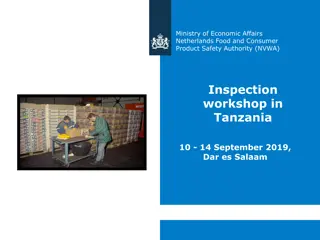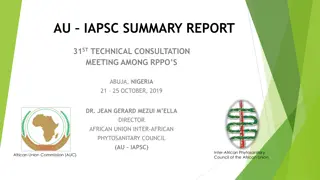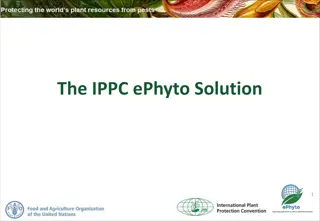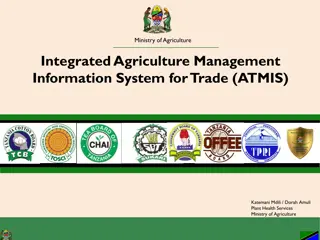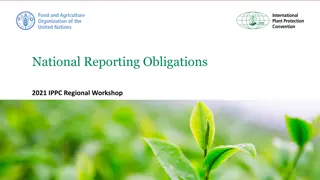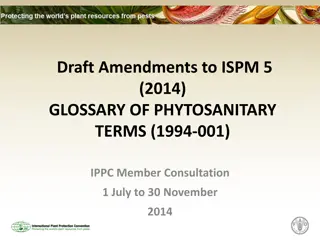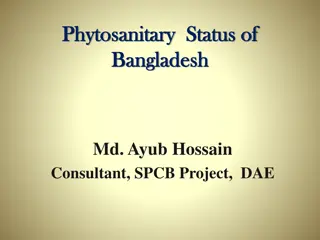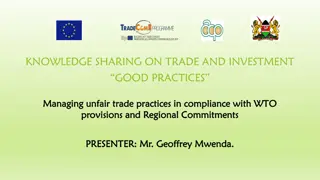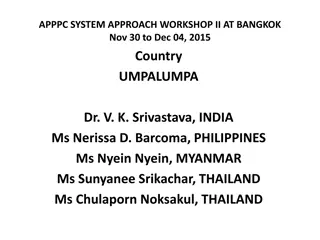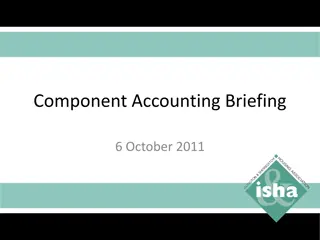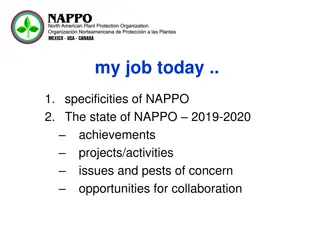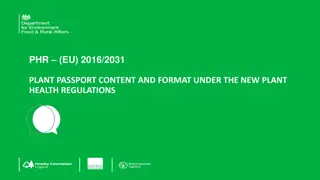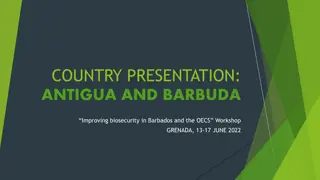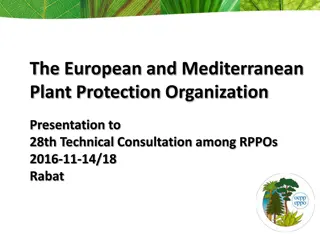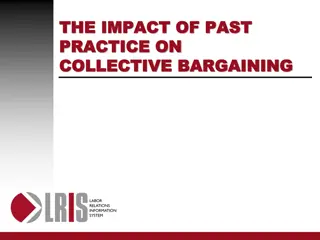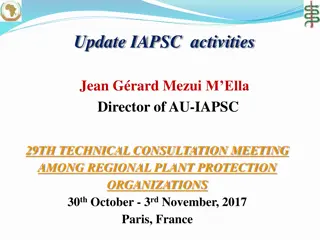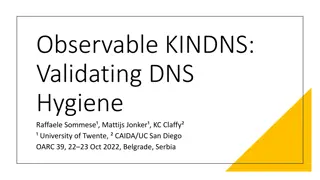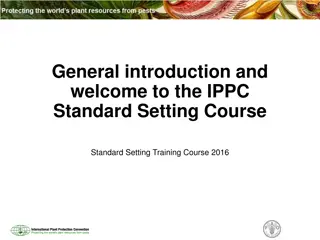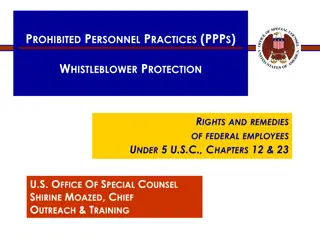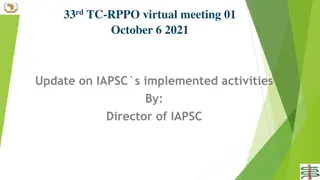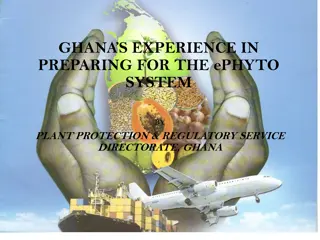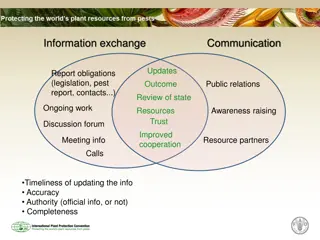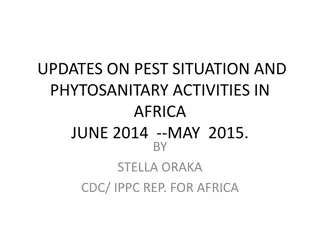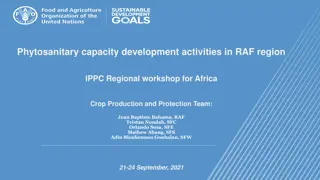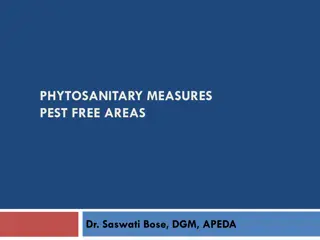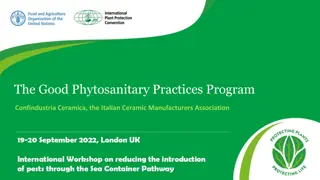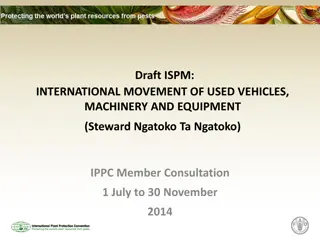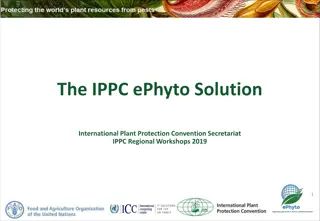Plant Health (Phytosanitary) Bill B14-2021 Presentation
Briefing the Portfolio Committee on Agriculture, Land Reform, and Rural Development on the Plant Health (Phytosanitary) Bill. Key concepts, problems addressed, historical timeline, and significance of the bill for South Africa's agricultural security are discussed.
0 views • 19 slides
Review of Grading Practices in PWCS and BRMS
This document outlines the assessment and grading practices in Prince William County Schools (PWCS) and Bull Run Middle School (BRMS) with a focus on providing feedback, enhancing student learning, and aligning assessments with learning outcomes. It includes information on assessment purposes, forma
3 views • 12 slides
Ensuring Biosafety in Laboratory Settings: Barriers and Practices
Biosafety in laboratories involves implementing various barriers and practices to prevent the release of biological agents and protect lab workers. These include primary and secondary barriers, personal protective equipment (PPE), containment principles, and adherence to biosafety practices. Safety
1 views • 41 slides
Farm Plan Requirements and Best Practices Presentation for Palo Verde Outfall Coalition
Detailed information is provided in the Farm Plan Requirements and Best Practices Presentation for Palo Verde Outfall Coalition, covering essential details such as farm owner and grower information, farm location specifics, crop details, irrigation methods, chemical applications, management practice
0 views • 11 slides
Safeguarding Children: Legislation Against Harmful Practices
The Child Care and Protection Act of 2015, Chapter 20, addresses harmful social, cultural, and religious practices affecting children in Namibia. The Act prohibits practices detrimental to children's well-being, such as child marriage, and imposes penalties on those who subject children to such prac
0 views • 14 slides
Implementing Evidence-Based Practices in Secondary Settings
Explore the relationship between RTI, evidence-based practices, and high leverage practices in secondary education. Understand the importance of implementing EBPs and HLPs across prevention tiers. Discover the key objectives and considerations for applying these practices effectively.
0 views • 62 slides
Understanding Sustainable Fishing Practices and Conservation Efforts
Sustainable fishing practices are crucial for maintaining healthy marine ecosystems. The Marine Stewardship Council ensures fishing is sustainable by leaving enough fish in the ocean, protecting fish habitats, and supporting fishing communities. Unsustainable fishing practices such as bycatch, shark
2 views • 8 slides
Revolutionizing Seed Trade Regulations: The ReFreSH Approach
A new approach, ReFreSH, aims to enhance the efficiency of managing phytosanitary risks in international seed movements by shifting focus towards accrediting producers and production processes. This system seeks to accommodate all seed sectors and company sizes while promoting global adoption of bes
0 views • 20 slides
International Standards on Phytosanitary Measures (ISPMs) Overview
The International Standards on Phytosanitary Measures (ISPMs) play a crucial role in safeguarding global plant resources from pests. Spearheaded by the IPPC Secretariat and supported by the STDF project 401, these standards aim to enhance phytosanitary capacity worldwide. The ISPM framework covers k
0 views • 22 slides
Workshop on Phytosanitary Inspection in Tanzania by the NVWA
The Ministry of Economic Affairs Netherlands, in collaboration with the Food and Consumer Product Safety Authority, conducted a workshop in Dar es Salaam, Tanzania, focusing on improving inspection procedures and infrastructure related to phytosanitary issues. The workshop addressed key areas such a
0 views • 9 slides
AU-IAPSC Summary Report: 31st Technical Consultation Meeting in Abuja, Nigeria
Report on the 31st Technical Consultation Meeting among RPPOs in Abuja, Nigeria, detailing the activities and projected activities of the African Union Inter-African Phytosanitary Council. The report covers the background, introduction, and accomplishments of AU-IAPSC, emphasizing its mission to enh
0 views • 14 slides
Revolutionizing Phytosanitary Certificates Exchange with ePhyto Solution
This cutting-edge ePhyto Solution project aims to streamline the electronic exchange of phytosanitary certificates globally. By introducing a harmonized set of rules, it facilitates interactions among developing and developed countries, reducing paperwork, costs, and delays associated with manual pr
0 views • 22 slides
Revolutionizing Agricultural Trade: The ATMIS Project in Tanzania
Explore the innovative Agriculture Management Information System for Trade (ATMIS) project in Tanzania, a digital transformation initiative aimed at streamlining operations for traders in the agricultural sector. Developed in collaboration with various regulatory bodies and crop boards, ATMIS simpli
0 views • 17 slides
National Reporting Obligations 2021 IPPC Regional Workshop Overview
The National Reporting Obligations workshop focuses on the importance of implementing reporting obligations to control pests of plants and plant products globally. It covers general reviews, public obligations, bilateral obligations, and the role of IPPC contact points. The workshop emphasizes ensur
0 views • 34 slides
Proposed Amendments to ISPM 5 (2014) Glossary of Phytosanitary Terms
The draft amendments to ISPM 5 (2014) Glossary propose additions and revisions to terminology related to phytosanitary measures. Changes include defining bark as a commodity, adding a declaration for regulated articles, and distinguishing between grain and seeds as commodity classes. The updates aim
0 views • 8 slides
Understanding Plant Quarantine and Phytosanitary Measures
Plant quarantine involves efforts to prevent the entry, establishment, or spread of foreign pests through legal restrictions on plant and plant product movement. It is crucial for safeguarding plant health, food production, and ecosystems. Phytosanitary measures aim to ensure the health of plants by
0 views • 33 slides
Housing Best Practices Forum: Enhancing Housing Options and Resource Collaboration
Explore the key agenda items, logistical details, forum format, goals, and best practices review from a recent Housing Best Practices Forum. The forum aims to amplify housing choices, improve resource utilization, foster collaboration among stakeholders for innovative housing solutions, share succes
0 views • 44 slides
Managing Unfair Trade Practices in Compliance with WTO
Unfair trade practices (UTP) encompass fraudulent, deceptive, or dishonest practices that are prohibited by law. The WTO provides remedies against UTP, allowing governments to address genuine harm to domestic industries. Kenya has taken steps to combat UTP by enacting the Trade Remedies Act and esta
3 views • 17 slides
Exporting Plants and Plant Products: A Guide to PHEATS Scheme
Explore the journey of exporting plants and plant products in England & Wales, including the Plant Health Exports Audited Trader Scheme (PHEATS). Understand the roles, requirements, and benefits of PHEATS in facilitating the exports of high-frequency produce and cut flowers. Learn about the steps in
0 views • 15 slides
Information on Tomato Production Conditions and Export Requirements in UMPALUMPA, LUNAPAIS, and TRIFOUILLI LES OIES
Detailed information is provided on the conditions for tomato production in UMPALUMPA, LUNAPAIS, and TRIFOUILLI LES OIES, including temperature ranges, humidity levels, and seasonal variations. Additionally, the export requirements such as phytosanitary measures and quarantine pests for these region
0 views • 11 slides
Evolution of Accounting Practices in Social Housing Properties
Historic accounting practices for housing properties in the social housing sector underwent significant changes prior to and after the accounting period ending 1997/1998. Initially, all property assets were capitalized including major repair expenditure. However, a shift occurred leading to the remo
0 views • 44 slides
NAPPO: Enhancing Collaboration and Plant Health Protection
NAPPO, a forum for Canadian, United States, and Mexican professionals, promotes harmonized approaches to plant health and safe trade. Through collaboration with strategic partners like IPPC and EPPO, NAPPO works on developing regional standards, hosting workshops, and engaging stakeholders to enhanc
0 views • 13 slides
Insights from 2024 Survey on GP Practice Contacts
Detailed findings from the 2024 survey reveal that 67% had a good overall experience contacting GP practices, 74% accessed NHS services when practices were closed, and 56% used pharmacy services. Access to GP practices was rated at 50% easy on the phone, 48% easy on practice websites, and 45% easy v
0 views • 16 slides
Understanding Plant Passports in EU: Regulations, Requirements, and Differences
Learn about the Plant Passport (PP) system in the EU under the new plant health regulations. Explore the content, format, and requirements for issuing PPs, including the distinction between PPs and Phytosanitary Certificates (PCs). Discover the purpose of PPs, how to become authorized to issue them,
0 views • 23 slides
Enhancing Biosecurity Measures in Antigua and Barbuda for Agricultural Sustainability
Explore the initiatives undertaken by Antigua and Barbuda to improve biosecurity through workshops and organizational strategies, focusing on plant protection, pest management, and import permit regulations. Learn about the current procedures for import applications and phytosanitary certificates to
0 views • 16 slides
European and Mediterranean Plant Protection Organization Overview
The European and Mediterranean Plant Protection Organization (EPPO) was established in 1951 and has grown to encompass 51 member countries across Europe, North Africa, the Mediterranean, and Central Asia. EPPO focuses on plant quarantine and protection products, with a dedicated team managing variou
0 views • 22 slides
Understanding the Impact of Past Practices on Collective Bargaining
Exploring the significance of past practices in interpreting, supplementing, and potentially contradicting contract language within the context of collective bargaining. Covering topics such as the definition of past practices, the duty to bargain, waivers of protest rights, and remedies for unlawfu
0 views • 35 slides
Update on IAPSC Activities: Technical Consultation Meeting 2017
This update highlights the achievements and initiatives of the International Association for Phytosanitary Capacity Building (IAPSC), focusing on capacity development, strategic planning, and coordination for plant protection in Africa. It discusses the outcomes of the 29th Technical Consultation Me
0 views • 20 slides
Improving DNS Security with KINDNS Best Practices
Best practices for improving DNS resilience and security are crucial for protecting billions of Internet users. Initiatives like KINDNS aim to establish global norms to enhance DNS security by codifying these practices. The KINDNS group focuses on practices for authoritative and recursive nameserver
0 views • 17 slides
Understanding the IPPC Standard Setting Process - A Comprehensive Overview
Explore the IPPC standard setting process through this course, covering the steps involved, bodies and roles, and ways NPPOs can contribute. Gain insights into the roles of various entities like the Standards Committee, Expert Working Groups, and more. Understand the significance of the IPPC Secreta
0 views • 76 slides
Federal Employee Whistleblower Protection and Prohibited Personnel Practices Overview
Federal employees are protected against prohibited personnel practices through whistleblower rights and remedies under United States Code. The Office of Special Counsel investigates and seeks corrective actions for prohibited practices. Key concepts include merit system principles and the framework
0 views • 23 slides
Update on IAPSC's Implemented Activities in TC-RPPO Virtual Meeting
Technical Consultations among Regional Plant Protection Organizations are being held virtually due to the COVID-19 outbreak. This update covers activities implemented by IAPSC since the 32nd TC-RPPO meeting, including participation in various virtual meetings and workshops focused on plant health an
0 views • 10 slides
Ghana's Experience in Preparing for the ePhyto System by Plant Protection & Regulatory Service Directorate, Ghana
The presentation outlines Ghana's preparedness for the ePhyto system, including setting up the ePhyto, challenges, expectations for international trade, and conclusion. Ghana's National Plant Protection Organizations play a crucial role in ensuring phytosanitary certificates meet import requirements
0 views • 15 slides
Enhancing International Phytosanitary Information Exchange for Improved Cooperation
Enhancing international phytosanitary information exchange is crucial for promoting cooperation among National Plant Protection Organizations. The role of Regional Plant Protection Organizations (RPPOs) in coordinating activities and facilitating communication is key to achieving the objectives of t
0 views • 11 slides
Updates on Pest Situation and Phytosanitary Activities in Africa (June 2014 - May 2015)
Stella Oraka's report highlights the pest situation in Africa from June 2014 to May 2015. It covers the Locust Emergency Response Programme in Madagascar, the threat of Deadly TR4 Banana Fusarium globally, the invasion of Tuta absoluta in various regions, and the presence of Potato Cyst Nematode in
0 views • 16 slides
Phytosanitary Capacity Development Activities in RAF Region - IPPC Regional Workshop for Africa Crop Production and Protection Team 2021
Plant pests are spreading due to increased global movement, causing losses. FAO interventions focus on pest prevention, management, diagnostics, surveillance, and cooperation in Africa. Programs target major pests like Fall Armyworm, Desert Locust, and others in different subregions.
0 views • 12 slides
International Trade Agreements on Sanitary and Phytosanitary Measures
Phytosanitary measures, pest-free areas, and agreements such as the SPS and TBT aim to protect health and prevent trade barriers in international trade. The SPS Agreement focuses on sanitary measures based on risk assessment, while the TBT Agreement aims to prevent unjustified technical barriers to
0 views • 21 slides
The Good Phytosanitary Practices Program by Confindustria Ceramica
The Good Phytosanitary Practices Program by Confindustria Ceramica, the Italian Ceramic Manufacturers Association, focuses on promoting sustainable development and reducing the introduction of pests through the Sea Container Pathway. It emphasizes the pillars of sustainability and highlights the lea
0 views • 12 slides
Draft ISPM: International Movement of Used Vehicles, Machinery, and Equipment (Steward Ngatoko Ta Ngatoko)
This draft ISPM addresses the pest risks associated with the global movement of used vehicles, machinery, and equipment, offering phytosanitary measures for various sectors. It outlines the regulatory history, considerations, and appendices for reference. Specific guidance is provided to NPPOs regar
0 views • 7 slides
Understanding ePhyto: The Future of Electronic Phytosanitary Certificates
The IPPC ePhyto Solution Project facilitates electronic exchange of phytosanitary certificates, offering a harmonized set of rules for safe trade. ePhyto is the electronic alternative to paper certificates, ensuring secure issuance and approval by NPPO officers. This innovative system enhances globa
0 views • 19 slides
